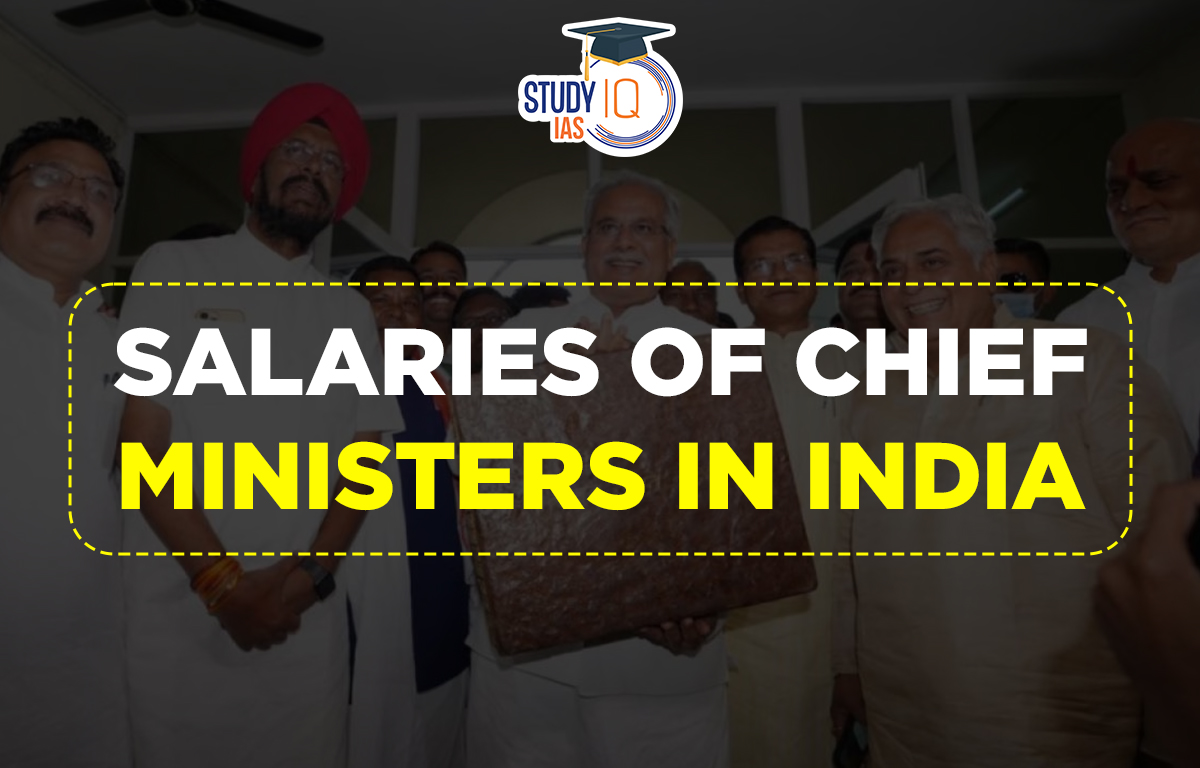Table of Contents
The salary of Chief Ministers in India ranges from ₹1.25 lakh to ₹4.10 lakh per month in 2024, depending on the state. This salary structure is determined by each state’s government, allowing for variations across India. In addition to their basic salary, Chief Ministers also receive several perks, benefits, and allowances such as official residences, vehicles, travel allowances, security cover, staff support, medical facilities, pensions, and other retirement benefits.
Salary of Chief Ministers in India Per Month
The Chief Minister’s Salary in India varies depending on the state in which they are elected. The CM’s monthly salary is between Rs. 1,25,000 and Rs. 4,00,000, depending on the state. This salary excludes various allowances, such as a house allowance, travel allowance, and telephone allowance, which vary from state to state. The Chief Minister is the most powerful politician elected to lead a state government and oversees all departments.
Candidate can check UPSC Syllabus 2025 Here!
Chief Minister Salary State Wise
Salary of various Chief Ministers in various states (comprising salary as a CM of a state and compensation received as an MLA/MLC, respectively). Rich Indian states pay handsome salaries to their Chief Ministers, whereas poor conditions, like all North East states, pay lower salaries to their Chief Ministers. Surprisingly, only three states, Telangana ₹410,000, Delhi ₹390,000, and Uttar Pradesh ₹365,000, pay higher salaries than state governors.
| S.N. | State and UT | Salary (per month in Rupees) |
| 1. | Telangana | ₹410,000 (US$5,900) |
| 2. | Delhi | ₹390,000 (US$5,600) |
| 3. | Uttar Pradesh | ₹365,000 (US$5,300) |
| 4. | Maharashtra | ₹340,000 (US$4,900) |
| 5. | Andhra Pradesh | ₹335,000 (US$4,800) |
| 6. | Gujarat | ₹321,000 (US$4,600) |
| 7. | Himachal Pradesh | ₹310,000 (US$4,500) |
| 8. | Haryana | ₹288,000 (US$4,200) |
| 9. | Jharkhand | ₹272,000 (US$3,900) |
| 10. | Madhya Pradesh | ₹255,000 (US$3,700) |
| 11. | Chhattisgarh | ₹230,000 (US$3,300) |
| 12. | Punjab | ₹230,000 (US$3,300) |
| 13. | Goa | ₹220,000 (US$3,200) |
| 14. | Bihar | ₹215,000 (US$3,100) |
| 15. | West Bengal | ₹210,000 (US$3,000) |
| 16. | Tamil Nadu | ₹205,000 (US$3,000) |
| 17. | Karnataka | ₹200,000 (US$2,900) |
| 18. | Sikkim | ₹190,000 (US$2,700) |
| 19. | Kerala | ₹185,000 (US$2,700) |
| 20. | Rajasthan | ₹175,000 (US$2,500) |
| 21. | Uttarakhand | ₹175,000 (US$2,500) |
| 22. | Odisha | ₹160,000 (US$2,300) |
| 23. | Meghalaya | ₹150,000 (US$2,200) |
| 24. | Arunachal Pradesh | ₹133,000 (US$1,900) |
| 25. | Assam | ₹125,000 (US$1,800) |
| 26. | Manipur | ₹120,000 (US$1,700) |
| 27. | Nagaland | ₹110,000 (US$1,600) |
| 28. | Tripura | ₹105,500 (US$1,500) |
Highest salary of Chief Minister in India
The Chief Minister of Telangana received the highest salary, which is ₹410,000 per month. It contains allowances for security, office expenses, and housing, which can push the total remuneration higher. The exact salary slips or specific breakdowns of CM are not publicly accessible due to privacy and security considerations.
| Telangana | ₹410,000 (US$5,900) |
CM Salary Constitutional Provisions
The Indian Constitution states that the Governor appoints the Chief Minister in Article 164. Our country currently has 28 states and 8 Union Territories (UTs). The Chief Minister (CM) of each state is paid a monthly salary for their services. The Indian Constitution does not directly specify the salary of the Chief Minister or other ministers. Instead, it provides a framework for determining their remuneration within each state. Here’s a breakdown of the key provisions:
Article 164 of Indian Constitution
- This article states that the Governor of a state shall appoint the Chief Minister and other ministers.
- It further specifies that the salaries and allowances of ministers shall be determined by the state legislature.
- Until the legislature decides on the salary, the provisions of the Second Schedule of the Constitution apply.
Second Schedule
- This schedule specifies the salary and allowances of various dignitaries, including the Chief Minister and ministers.
- The salaries listed in the Second Schedule serve as a temporary measure until the state legislature determines the final amount.
Factors to Decide the Chief Ministers Salary in India
When calculating the salaries of Chief Ministers and other ministers from union government secretaries, the following factors are taken into account:
- The minister is paid a salary by the state government from which he or she is appointed.
- Each state has a different pay scale for ministers, so the salary structure is unique.
- The pay scale of ministers varies by state due to differences in seniority and competence of ministers in different states, differences in cabinet composition, and so on. Other considerations include ministers’ workload and responsibilities, as well as the officers’ current pay scale in states.
Roles and Responsibilities
The Chief Minister in India is the head of a state government and holds significant power and responsibility. CM has the following roles and responsibilities:
| Roles and Responsibilities | |
| Executive Functions |
|
| Legislative Functions |
|
| Budgetary Functions |
|
| Representing the State |
|
| Maintenance of Law and Order |
|
| Emergency Situations |
|
| Development and Welfare |
|
Additional Perks and Allowances for Chief Ministers
Aside from their salaries, Chief Ministers enjoy a range of perks and allowances, including:
- Official Residence: Each Chief Minister is provided with a fully furnished official residence.
- Vehicle and Travel Allowances: CM’s have access to official vehicles and generous travel allowances.
- Security Cover: Depending on their state and personal risk, CMs receive security ranging from police escorts to full-fledged Z or Z+ security.
- Medical Facilities: Chief Ministers are eligible for top-tier medical care at both government and private hospitals.
- Staff Support: CM offices are equipped with personal staff, including assistants, drivers, and security personnel.
- Pensions: After serving as Chief Ministers, they are entitled to receive pensions and retirement benefits, often for life.
Factors Influencing CM Salaries in India
The salary of Chief Ministers in India is influenced by several factors:
- State Policies: Each state’s legislative body has the authority to decide the CM’s salary.
- Economic Conditions: States with stronger economies and higher GDP may offer higher salaries to their Chief Ministers.
- Role Significance: The responsibilities and workload of a Chief Minister also play a significant role in determining their compensation.
- Experience: The length of service and political experience of a Chief Minister may impact their salary.


 Miss Universe Winners List From 1952 to ...
Miss Universe Winners List From 1952 to ...
 Significance and History of Diwali Festi...
Significance and History of Diwali Festi...
 Asia Cup Winners List (1984–2025): Ind...
Asia Cup Winners List (1984–2025): Ind...

























